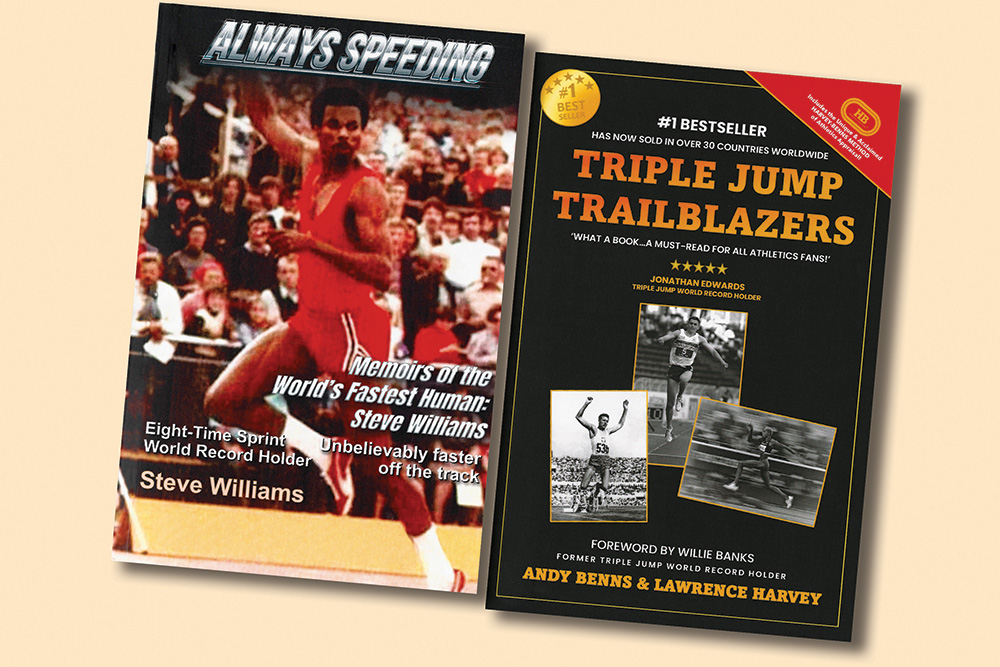Sprinter Steve Williams’s romp through the Wild West of the ’70s sport and a profile of triple jump greats were just two of four track & field books on Ed Fox’s reading list this summer.
THE FRONTRUNNER, by Brad Fawley. I rarely read track & field fiction, knowing that usually there will be a lack of authenticity and inaccuracies that will spoil my reading pleasure. I had hopes for The Frontrunner, despite the trite plot of clean American heroic distance runner vs. evil Russian dopers, in this case the Pushkin twins. Yes, the Pushkin twins.
Fawley can write, and it all goes along smoothly until it goes stunningly off the rails. Our hero, Russ Clayton, decides he must, like Zátopek in 1956, go for an Olympic triple despite not having run a race in two or three years. But under the tutelage of a former Olympic silver medalist (he was edged for gold by the current coach, and doper in chief, of the Pushkin twins), Clayton quickly becomes a world beater.
Despite not having raced in a couple of years, he is asked by his former coach at Oregon to rabbit in the Pre Classic and of course he doesn’t step off the track but beats the best 1500m runners in the world, setting an American Record, and continuing another lap or more, setting a 2000 record in that same race.
Does that sound a little farfetched? Yes, it does. His Cerutty-like coach convinces him to go for the 1500-5000-10,000-marathon quadruple in the upcoming Olympics, as if the triple weren’t ridiculous enough. After winning the first three races handily in the Games, he’s narrowly edged in the marathon by Sergei Pushkin, brother Mischka staggering home in 3rd.
The medics fail to revive Mischka (who has taken a new drug ordered by the coach) and Sergei makes a speech on the victory stand, blaming the coach for his brother’s demise and confessing to drug use over the years. The coach grabs the microphone and claims innocence, but the investigators disqualify Sergei and award a fourth gold to Russ. This is all laughable. If they allowed gold medal winners, and coaches, to make speeches on the victory stand, we spectators would never have gotten home!
There’s so much more wrong with these final chapters that I wish he had let a T&FN reader look them over and set him straight before publication. OK, no more track & field fiction for me!
COACH OF CHAMPIONS: D.L. Holmes and the Making of Detroit’s Track Stars, by Keith Wunderlich and David L. Holmes, Jr. When I told co-author Wunderlich I didn’t think Coach Holmes was well-known enough to get a review in these pages, he asked me to read Chapter 4 — the story of how Holmes trained John Lewis, who was removed from the U.S. 4×400 relay team at the 1924 Olympics at the last moment.
It seems chef de mission Douglas MacArthur (yes, that MacArthur) was feeling pressure to get more gold medals for the USA, and he replaced Lewis with 400m champion Ray Barbuti.
I did read it and that induced me to read more, and I ended up really enjoying this book. It is a history of Holmes’ life, especially his 41-year tenure (1917-1958) as Wayne State’s track coach, combined with chapters containing conversations with several of his former athletes. It is a remarkable slice of Americana, a longtime coach at a small college, with virtually no financial support, yet prevailing as a profound positive influence on countless young men, athletically, morally and personally. Anyone might enjoy this book, not just Michiganders.
TRIPLE JUMP TRAILBLAZERS, by Andy Benns and Lawrence Harvey. Looking at the front cover of this book, I had to laugh. “#1 Best Seller,” “Now Sold in Over 30 Countries Worldwide,” Huh? A book on… triple jumping? Okay let them have their hyperbole.
In fact this is a prodigious work of scholarship, with very good accounts of all the best triple jumpers of history down to the present day (2023). The authors recount each athlete’s technical strength and even tell of their post-competition lives. I didn’t know (or had forgotten) that the great Adhemar da Silva, two-time Olympic champion, played the “spectral apparition of Death” pursuing Eurydice during Carnival in the classic film Black Orpheus. And I certainly didn’t know that Giuseppe Gentile, brief WR holder and bronze medalist at Mexico City, played Jason opposite Maria Callas in the 1969 movie Medea. Ah, these triple jumpers — very versatile folks.
The one complaint I have is the tiny postage-stamp photos throughout the book. The triple jump trailblazers deserve better.
ALWAYS SPEEDING: Memoirs of the World’s Fastest Human: Steve Williams. This is truly an autobiography, written by Steve Williams. Don’t expect correct punctuation, spelling, proofreading and fact checking (Williams says as much in a disclaimer at the beginning of the book). That being said, I thoroughly enjoyed the book which will transport any track fan back to the ’70s, an era of shamateurism, back door deals and the beginnings of steroid abuse. But memorable track & field accomplishment, as well.
Because of ill-timed injury, Williams was one of the best sprinters who never had the chance to win an Olympic medal. Lots of nostalgia in the book, with names like Al Franken, Tom Moore, Wayne Vandenburg, Zürich Weltklasse headman Andreas Brügger, Jimmy Carnes, the Dassler Brothers of adidas-Puma rivalry, Brooks Johnson, and many more.
As a portrait of the wine, women, and song, as it were, and the under-the-table dealing of the international track circuit in that era, I haven’t read anything so frank and revealing.
All of these books are available from amazon.com.
Post navigation
Discover more from 6up.net
Subscribe to get the latest posts sent to your email.


